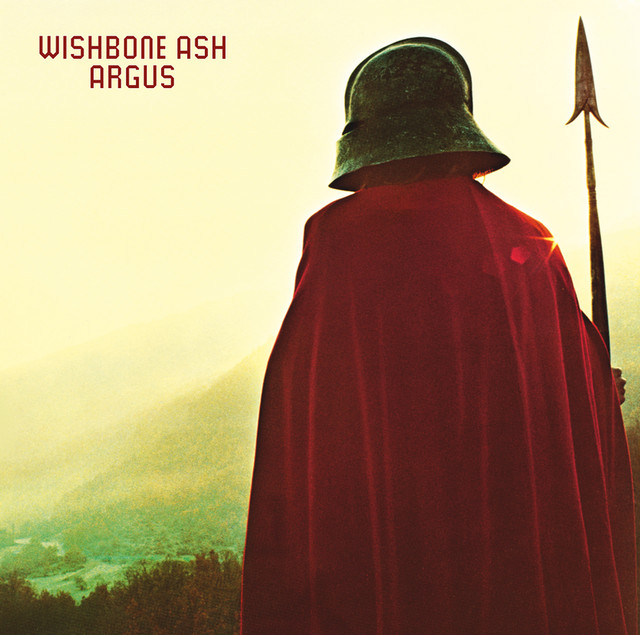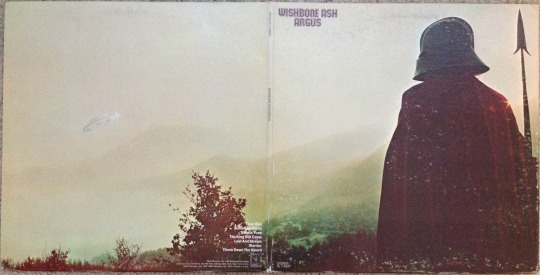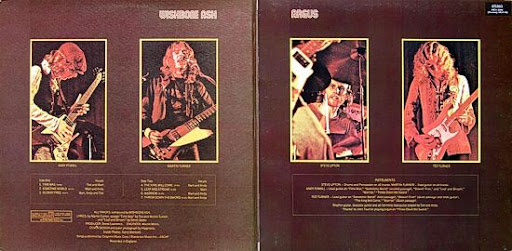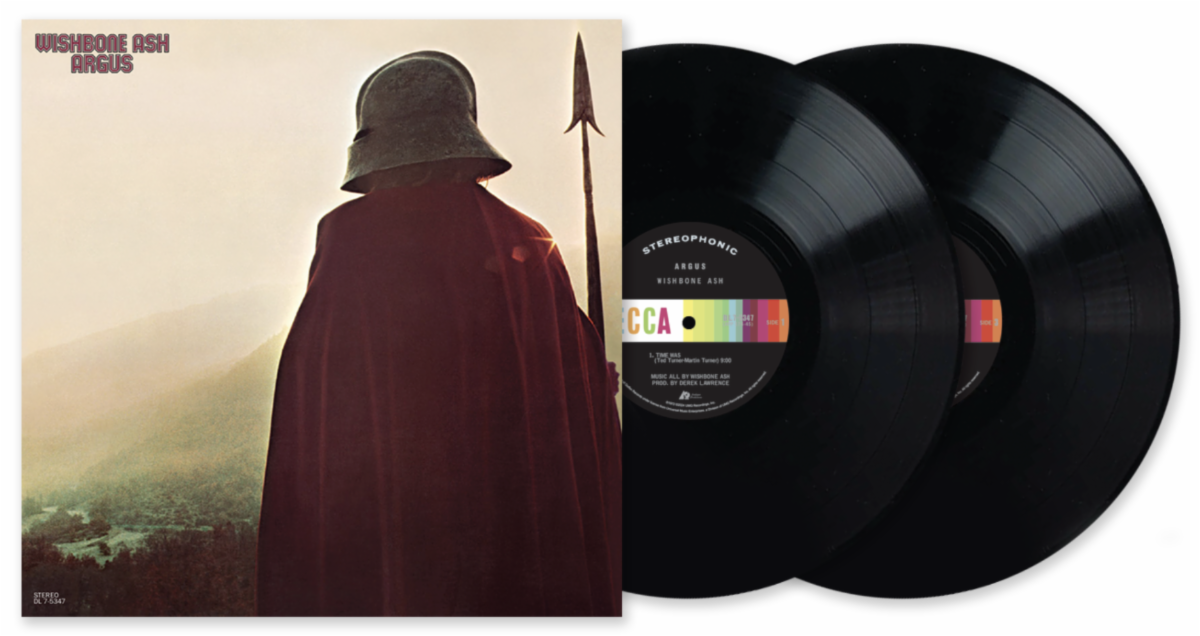'Argus' Marches Off from Analogue Productions
Sean Magee's 45 RPM treatment for Analogue Productions polishes the helmet of Wishbone Ash's defining LP
Wishbone Ash’s Argus was made in rock-and-roll’s golden age; when labels pelted fistfuls of money at any band with guitars, bass, drums, someone who could shake a tambourine, and someone who could sing harmony. This is evidenced by a minor-gods-canon band like Wishbone Ash getting the esteemed honor of a Hipgnosis cover. Assistant Bruce Atkins was dressed up in a costume borrowed from The Devils and posed over the Verdon Gorge in France. When folding out the jacket, the viewer sees the spoils our conqueror would presumably take – had conquerors of the extraterrestrial kind not already arrived. Who will win: spears or flying saucers? The combination of sci-fi and the Greco-Roman-17th century hodgepodge is the very definition of Hipgnosis. "Hip” for the new, “gnostic” of the old world. It makes for one of the collective’s most striking and unusual covers.

 (The gatefold is evidence of Storm Thorgerson’s “border period,” for what it's worth.)
(The gatefold is evidence of Storm Thorgerson’s “border period,” for what it's worth.)
 As an album art freak, I only really knew Argus for its cover. I had listened to the album in full maybe once before? Knowing it as a prog-adjacent staple and little else, I wanted to see if the book could be judged by the cover. A limited run of less than 1,000 little Arguses, remastered by Sean Magee at Abbey Road, have marched off in their domed helmets and red capes. One arrived on my doorstep, suited up in the sturdiest hurricane mailer I’ve ever handled in my life. (I breathed a sigh of relief, knowing I’d finally escape the curse of the track-one “pop” I run into with my reviews here.)
As an album art freak, I only really knew Argus for its cover. I had listened to the album in full maybe once before? Knowing it as a prog-adjacent staple and little else, I wanted to see if the book could be judged by the cover. A limited run of less than 1,000 little Arguses, remastered by Sean Magee at Abbey Road, have marched off in their domed helmets and red capes. One arrived on my doorstep, suited up in the sturdiest hurricane mailer I’ve ever handled in my life. (I breathed a sigh of relief, knowing I’d finally escape the curse of the track-one “pop” I run into with my reviews here.)
Before embarking on my hi-fi journey, though, I’d have to listen to my original US copy on Decca Records.
Contemplating the nuances of medieval folk and the heavy doses of prog that which bore it, I dropped the needle on a sentimental if wild, fast acoustic guitar arpeggio…
…then realized I’d accidentally left my turntable running at 45 RPM from the Clapton single before. Guilty as charged.
You, dear reader, will be pleased to know the three-minute acoustic movement of “Time Was” is just as lovely playing at the correct speed! The pastoral feel is accented by electric washes, like the sun breaking over the valley on the cover. The lyrics across side one of Argus are disarmingly human. No scenes invoking the Knights of the Round Table...not yet, at least. Fully expecting the Unicorn tapestry in song, I was taken aback by how grounded and approachable Argus’s opening statement was:
“I’ve got to rearrange my life.”
“Time Was” resonates for its positively human theme; picking up and moving on after a loss, while still allowing yourself the space to feel.
“I’ve got to rearrange my world,
I miss you, I need you,
I’ve got to keep my memories aside,
I’ve got to try to live again.”
The music itself is lovely. I can see why it had such a far reach: the rock-and-roll soldiers of Wishbone Ash conquered from the States (Lynyrd Skynyrd) to England (Iron Maiden) and beyond. Thin Lizzy can trace their ancestry back to Argus’s hit, “Blowin’ Free.” The lively twin guitars of the core movement of “Time Was,” wielded by Andy Powell and Ted Turner, remind me of early Yes’s agility. (Can’t Buy A Thrill-era Steely Dan might be a better comparison, but I am famously dismissive of the Dan. I’m choosing to ignore the similarity for the sake of not souring this review.) Though the sound of my copy interfered with it, I’m most impressed with how Martin Turner’s bass traverses Wishbone’s compositions like a searchlight. It stays close to the ground to navigate lively guitars.
Though the lyrics of Argus’s other highlight, “Sometime World,” aren’t quite as sharp (“Sometime world pass me by again,”) its open, easy structure makes opportunity for an unfussy but effective harmony down the octave. “Life had kept him waiting/Regretting his shame inside.” The cauterized wound still has a scar. ’70s prog largely navigated movements in the round. Wishbone Ash, though, leaned on studio tricks for Argus; heavily employing the crossfade. It’s distracting at times; most of the fun of prog is the listener’s total immersion. In “Sometimes World”’s brief transitional period, the chords the guys use are worthy of post-Peter Green, pre-Buckingham Nicks Fleetwood Mac. The second movement is energetic – an extended bass solo is always welcome. Andy and Martin’s dialogue is exhilarating.
The lyrics of Argus side two feel tedious compared to side one. Martin admitted he referenced the “very English, very medieval” music, as opposed to any lived experience. Wishbone Ash suddenly remembers what their album cover looks like, dealing themed titles “The King Will Come,” “Leaf and Stream,” “Warrior,” and “Throw Down The Sword.” I’m one for the prog cliché of wizards in space in search of the lost crystal of Noo or whatever, but I’m grateful the whole album didn’t sound like “Warrior.” The schtick would’ve gotten old fast. “King Will Come” is the most tolerable, with the guitars’ plucky advance towards the front line. Argus’s best moments consistently come from the wistful and real. “Blowin’ Free” reminisces on lost love, as does the Martin-Ted collaboration “Time Was.” Once again, the highlight is the bass coming out of its wine-drunk stupor for a last stand.
Overall, Argus was subdued compared to my expectations – and with about 100% less lute! There’s no bowing to classical music, or even a jazz twist. It’s surprisingly light-hearted fare, given the (quite literally) armor-heavy imagery. Enjoyable as the music was, my original copy was a disappointment. Plainly, the original US run sounds dull and flat. It’s like taking that helmet and squashing it under a great big ACME anvil. I interrupted my listening session to clean my stylus, only to find no dust or difference in sound. The bass runs into the drums runs into the rhythm guitar track, all muddied by latent surface noise. On a sound system like mine, any given LP has to try to muffle the bass. For whatever reason, the original Argus tried and succeeded. Nowhere to go but up, I guess.
At last, I could drop the needle on Analogue Productions’ treatment of Argus. Their superb treatment of Hipgnosis's art, on an old-school tip-on jacket, had my spirits high. The opening of “Time Was” was decidedly more ’90s shoegaze than I remembered. For a moment, I marveled in how ahead of their time Wishbone Ash must’ve been...until I realized I’d left my turntable at 33 1/3 RPM.
“Time Was” is treated as the highlight it should be. Moving into the gliding second movement, the left channel suddenly comes alive. But there’s no such thing as a perfect treatment of every instrument on a recording. Through the movement into “Time Was”’s chorus, I heard a strange warble in the cymbal. I checked the speed my turntable was running at (again,) the weight on my tonearm, I even cleaned my stylus again. Consulting a version on streaming services, I found this blemish was definitely in the album itself. Blame Derek Lawrence, not Sean Magee! It’s a shame, because every other part of the drum kit in every other part of the song sounds fantastic. The bass travels in long, nimble arcs; especially on “King Will Come.” Ted and Andy’s guitar solos are balanced well, not overpowering the rhythm section. For better or worse, Magee’s treatment uncovers what was always there.
The acoustic guitar of “Sometime World” remains light and pretty, but I would’ve appreciated a little more out of it it. The electric guitars glide over top, and just a whisper of that harmony vocal, an octave below, piques the listener’s ear. The bass in its second movement acts like a lead guitar would, full of personality.
I’m pleased to report there isn’t a lick of surface noise on this run of Argus. Such should be expected of Quality Record Pressings wax - or so I'm told. Quality this high is typically out of this author's budget. The dynamics are there within the instruments; agile, while not being scrubbed too clean. Hi-hat is so delicate in beginning of “Blowin Free,” as if it was whispered into the record. But for a rock album, the volume of the whole thing is subdued. If you’re not willing to crank to the level of neighbor’s-ire, Wishbone Ash’s otherwise-energetic performances are sleepy. A little muscle would’ve benefited cuts like “Warrior.”
Though it benefits the sound, Analogue’s 45 RPM two-disc format is a clumsy handling of the album’s sequencing. Having a break between “Leaf and Stream” and “Warrior” creates space in the narrative where there shouldn’t be. The dance of guitars and tambourine (don’t count out percussion!) on “Leaf and Stream” makes a case for this pressing’s subtlety. The second guitar part is gently lifted to the top; curling like a green shoot. Though the mini-concept album isn’t what draws me to Argus, there are beautiful moments on side two; like the fade-in on “The King Will Come.” The bass is light, but still powerful, like an archer shooting an arrow through the air. “Warrior”’s gentle build in dynamics, lead by Ted Turner’s guitar, was also handled wonderfully. “Throw Down The Sword”’s dueling solos are the perfect way to end the LP; making the listener forget the half-baked lyrics. This is the only moment on Magee’s treatment one can truly describe as searing. Once neighbors were occupied and relevant windows and doors were shut, I could adjust the volume and really immerse myself in Argus.
 Sean Magee’s treatment of Wishbone Ash’s high-water mark has illuminated Derek Lawrence’s craft. Even moments that would benefit from a little fuzz, like disrupted cymbals, are uncovered. Sean understands the principle that one must honor what the work truly is, not what it could be. While perfection is always the goal, blemishes are more stimulating than perfection. The soldier on the front cover is majestic, but the spaceship on the back makes it interesting. Analogue Productions strove to make a perfect Argus, but made something more rewarding: an Argus a listener can engage with.
Sean Magee’s treatment of Wishbone Ash’s high-water mark has illuminated Derek Lawrence’s craft. Even moments that would benefit from a little fuzz, like disrupted cymbals, are uncovered. Sean understands the principle that one must honor what the work truly is, not what it could be. While perfection is always the goal, blemishes are more stimulating than perfection. The soldier on the front cover is majestic, but the spaceship on the back makes it interesting. Analogue Productions strove to make a perfect Argus, but made something more rewarding: an Argus a listener can engage with.










































.png)








